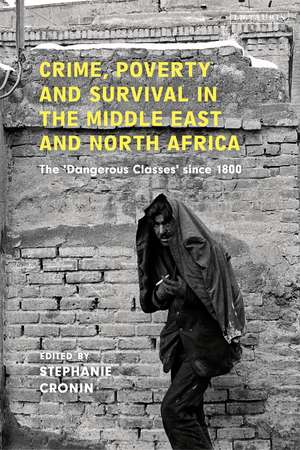Crime, Poverty and Survival in the Middle East and North Africa: The 'Dangerous Classes' Since 1800
Editat de Stephanie Croninen Limba Engleză Paperback – 28 iul 2021
| Toate formatele și edițiile | Preț | Express |
|---|---|---|
| Paperback (1) | 220.02 lei 6-8 săpt. | |
| Bloomsbury Publishing – 28 iul 2021 | 220.02 lei 6-8 săpt. | |
| Hardback (1) | 657.70 lei 6-8 săpt. | |
| Bloomsbury Publishing – 27 noi 2019 | 657.70 lei 6-8 săpt. |
Preț: 220.02 lei
Preț vechi: 276.11 lei
-20% Nou
Puncte Express: 330
Preț estimativ în valută:
42.11€ • 43.44$ • 35.64£
42.11€ • 43.44$ • 35.64£
Carte tipărită la comandă
Livrare economică 04-18 martie
Preluare comenzi: 021 569.72.76
Specificații
ISBN-13: 9780755645015
ISBN-10: 0755645014
Pagini: 328
Dimensiuni: 156 x 234 mm
Greutate: 0.46 kg
Editura: Bloomsbury Publishing
Colecția I.B.Tauris
Locul publicării:London, United Kingdom
ISBN-10: 0755645014
Pagini: 328
Dimensiuni: 156 x 234 mm
Greutate: 0.46 kg
Editura: Bloomsbury Publishing
Colecția I.B.Tauris
Locul publicării:London, United Kingdom
Caracteristici
Responds to a growing academic appetite for 'history from below'
Notă biografică
Stephanie Cronin is Elahé Omidyar Mir-Djalali Research Fellow at St Antony's College and a member of the Faculty of Oriental Studies, University of Oxford. She is the author of seven books, including Armies and State-building in the Modern Middle East: Politics, Nationalism and Military Reform (I. B. Tauris, 2014) and The Army and the Creation of the Pahlavi State in Iran, 1910-1926 (I. B. Tauris, 1997).
Cuprins
AcknowledgementsNote on transliteration The Dangerous Classes in the Middle East and North Africa Stephanie Cronin, University of Oxford, UK Part One: Dangerous Women Disciplining Sex Work in Colonial Cairo Francesca Biancani, Bologna University, Italy Governing Prostitutes with Fear and Compassion: The Red-Light District of Tehran, 1922-1970Jairan Gahan, University of Toronto, Canada "Disorderly Women" and the Politics of Urban Space in Early 20th Century Istanbul (1900-1914)Müge Özbek, Koç University, Turkey Disreputable by Definition: Respectability and Theft by Poor Women in Urban Interwar EgyptHanan Hammad, Texas Christian University, USA Part Two: Banditry and Crime Noble Robbers, avengers and entrepreneurs: Eric Hobsbawm and banditry in Iran, the Middle East and North AfricaStephanie Cronin, University of Oxford, UKRural Banditry in Colonial Algeria, 1871-1914Antonin Plarier, Panthéon Sorbonne University, France A State of Tribal Lawlessness? Rural and Urban Crime in Fars Province, 1910-15Mattin Biglari, SOAS, University of London, UK Rural Crimes As Everyday Politics of Peasants: Tax Delinquency, Smuggling, Theft and Banditry in Modern TurkeyMurat Metinsoy, Istanbul University, Turkey Part Three: Dangerous Streets: Urban food riots in late Ottoman Bilad al-Sham as a 'repertoire of contention'Till Grallert, Orient-Institut Beirut of the Max Weber Foundation, Lebanon The Dangerous Classes and the 1953 Coup in Iran: On the Decline of lutigari MasculinitiesOlmo Gölz, University of Freiburg, Germany The 'Virtual Poor' in Iran: Dangerous classes and Homeless Life in Capitalist TimesMaziyar Ghiabi, University of Oxford, UK Index
Recenzii
Accepting the social notion of class and frequently relying on the foundational theories of prominent sociologist Eric Hobsbawm, this collection brings the well-known social history of 'dangerous classes' in Europe to bear on the Middle East and North Africa. Cronin (Univ. of Oxford, UK) has compiled 11 essays from well-recognized scholars of the region that look at societies in Iran, Turkey, Egypt, and Algeria from the bottom up. In already underdeveloped countries with segmented economies that tend to protect those with accumulated social and economic success, the lumpenproletariat (the unproductive) turns to what is available based on street-learned skills and adaptability. For women, this has traditionally meant turning to the 'oldest known profession,' prostitution; for urban youth and rural agricultural workers lacking regular support, the primary alternatives have been gangs and banditry. What comes through in many essays is the general opposition among this class of people, across countries, to the political establishment, regardless of whether it is the tax collector, the landowner, or the national government. This is a well-created sociohistorical collection worthy of addition to Middle East collections. Summing Up: Recommended. Upper-division undergraduates through faculty; professionals.
